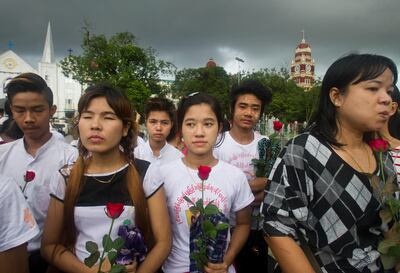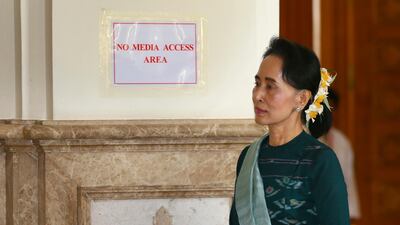Nobel peace laureate Aung San Suu Kyi is facing increasing international pressure to address the current crisis in Rakhine state where hundreds have died and tens of thousands been displaced as Myanmar’s military responds to attacks by Rohingya insurgents.
Britain’s foreign secretary Boris Johnson warned her on Sunday that treatment of the Rohingya was “besmirching” Myanmar’s reputation; while fellow laureate Pakistani activist Malala Yousafzai condemned the treatment of the Rohingya and appealed to Ms Suu Kyi to end to the violence.
Their comments are the latest to highlight concerns over the one-time human rights champion’s failure to defend the Muslim population in Rakhine.
Now de facto leader of Myanmar’s government, Ms Suu Kyi’s stance on the Rohingya drew criticism from abroad even before she swept to victory in November 2015 in the country’s first democratic election in decades.
Some observers believed her silence on the issue at that time was a temporary stance to avoid further riling hardline nationalists ahead of the crucial elections. However, her decision to put forward a candidate list for her National League for Democracy Party that did not contain a single Muslim candidate was considered ominous in some quarters.
Immediately after the election, her representatives told journalists that the Rohingya were “not a priority” for the new government.
But under international pressure, she appointed the Kofi Annan-led advisory commission to seek long term solutions to the Rakhine problems — despite objections within Myanmar to the involvement of three international representatives on the nine-person commission.
While Ms Suu Kyi was commended by most in the international community for the decision, others saw it as little more than a PR move — an opinion that received some validation when her spokesman later admitted that the government was using the commission as “a shield” when accused of rights abuses.
It was not until a new insurgent group, now calling itself the Arakan Rohingya Salvation Army (Arsa), emerged in October 9 launching a series of deadly attacks on border security posts that the full extent of Ms Suu Kyi’s complicity with those accused of the alleged abuses became apparent.
When evidence emerged of horrific attacks on Rohingya civilians by Myanmar’s security forces following last October's atrocities — which the UN have said likely amounted to crimes against humanity — the government established the “state counsellor’s information committee” to address what it claimed was “biased” and “fake” news in the international media.
As international critics condemned Ms Suu Kyi for her “silence” over the unfolding crisis, inside the country a very clear message was emerging from her office.

While she did not make direct personal statements against the Rohingya, the information committee bearing her State Counsellor title was producing statements seeking to discredit anyone who made allegations of abuses against the military. For weeks, a now-notorious flashing banner headline greeted anyone who visited the committee’s webpage. It read “FAKE RAPE”. The site also contained the names of Rohingya women it claimed had lied about being raped by the military.
Despite this, those involved with the advisory commission believed she did genuinely wish to find a solution to the ongoing situation in Rakhine.
Observers saw it as a positive sign when she announced on August 24, the evening the commission’s recommendations were made public, that she would be appointing a ministerial body that includes international representatives to oversee their implementation.
The attacks by Arsa on August 25 were immediately condemned by Ms Suu Kyi. She also accused the group — now deemed a terrorist organisation by the government — of being deliberately timed to coincide with the launch of the Rakhine recommendations. Such an allegation has yet to be substantiated.
Since that initial statement, she has made no further official comments personally since the recent attacks. But statements and images published online by her information committee drew international outrage when they started using the term “extremist Bengali terrorists” to refer to the Rohingya involved in the fighting.
“Bengali” is used as a pejorative to imply the Rohingya are illegal immigrants from Bangladesh. International staff in Rakhine said the term was quickly picked up by the general public and used to refer to all Muslims there.
The statements also highlighted alleged links between international aid organisations and the “terrorists”. In an already paranoid climate, the posts were seen as being actively “inflammatory” further stirring up threats against those working for foreign aid workers.
___________________
For more:
'Beheadings of Rohingya children', arson and widespread abuses in Myanmar
Nearly 50,000 of Myanmar's Rohingya have fled towards Bangladesh
Satellite pictures show Rohingya villages in Myanmar razed
___________________
The World Food Programme, citing insecurity, has since stopped deliveries to an estimated 250,000 vulnerable people in Rakhine where malnutrion is widespread and many are already on the brink of starvation.
Five days into the current crisis, the information committee removed her State Counsellor title from its Facebook page used to disseminate those messages.
A government spokesman told The National this was done to make clear to the international media that the views published there represented those of the "whole government" not just Ms Suu Kyi.
In recent days, the government has also sought to make a clearer distinction — in its English language comments at least — between “innocent Muslims” and the terrorist community, but the damage is done.
Experienced Myanmar analysts say there is no way those previous statements could have gone out with the State Counsellor’s stamp on them without Ms Suu Kyi’s approval. She is after all notorious for taking an autocratic and micro-managing approach to governance.
If she had genuinely objected to the statements going out under her title she could have removed it a long time ago. Now, it seems little more than a belated public relations exercise aimed at avoiding international criticism.
However, any analysis of her involvement in the current crisis must take into account the fact the abuses alleged to be taking place now are being perpetrated by the military, not the civilian government.
The person ultimately responsible for any abuses by the army is Senior General Min Aung Hlaing, the head of the country’s powerful military.
Ms Suu Kyi has little to no power to intervene in how the army carries out its duties.
What she does have is power over is the hearts and minds of the vast majority of the Myanmar public. So far, that power has been used to further advance racism, fear, and the denigration of the victims of terrible abuses in Rakhine.
The slight change in tone of messaging from her government in the past few days may mark a realisation that the messages in the initial aftermath of the August 25 attacks are playing very badly on the international stage.
But it will require a much more dramatic change in leadership style and approach from Ms Suu Kyi herself if she is to guide the people of Myanmar towards finding a genuine solution to this crisis that respects the human rights of all people in Myanmar - whatever their religious or ethnic background.

